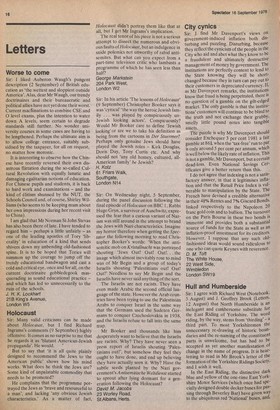City cynics
Sir: I find Mr Davenport's views on government-induced inflation both dis turbing and puzzling. Disturbing, because they reflect the cynicism of the people in the City who aid and abet what they know to be a fraudulent and ultimately destructive management of money by government. The institutions are perfectly content to lend to the State knowing they will be short changed because they in turn can pay out to their customers in depreciated currency. If, as Mr Davenport remarks, the institutions know that fraud is being perpetrated, there is no question of a gamble on the gilt-edged market. The only gamble is that the institutions' customers will continue to be blind to the truth and not exchange their grubby, smelly little pound notes into tangible assets.
The puzzle is why Mr Davenport should consider Exchequer 3 per cent 1981 a fair gamble at 861, when the 'tax-free' run to par is only around 5 per cent per annum, which is well below the likely rate of inflation. This is not a gamble, Mr Davenport, but a certain dead-loss. Even National Savings Certificates give a better return than this.
I do not agree that indexing is not a satisfactory answer, in that it legitimises inflation and that the Retail Price Index is vulnerable to manipulation by the State. The French have devised a credible alternative in their eti% Rentes and 7% Giscard Bonds, linked respectively to the Napoleon 20 franc gold coin and to bullion. The turnover on the Paris Bourse in these two bonds is immense and provides both a substantial source of funds for the State as well as an inflation-proof investment for its creditors. However, I suppose that any such oldfashioned ideas would sound ridiculous to one who can quote Keynes with reverence. D. M. Toft The White House, 22 West Side, Wimbledon London SW19


































 Previous page
Previous page